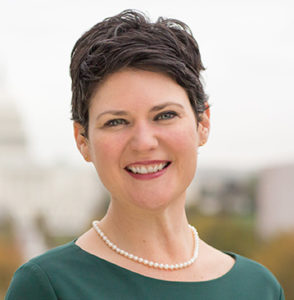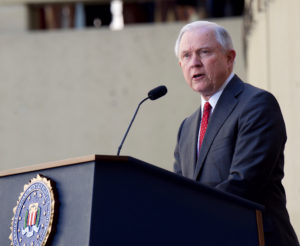The head of a Baptist organization specializing in matters involving church and state gave low marks to a new White House initiative to promote the administration’s views on religious liberty.

Amanda Tyler
Amanda Tyler, executive director of the Baptist Joint Committee for Religious Liberty, said she supports some of what Attorney General Jeff Sessions said in a July 31 speech announcing the establishment of a Religious Liberty Task Force to enforce guidance on church/state dispute the Justice Department issued last year.
Tyler took issue, however, with “the oversimplification of unsettled legal questions involving the free exercise of religion” and “near total omission of any concern for government promotion of religion” in the Sessions speech.
In remarks delivered at Monday’s Religious Liberty Summit, Sessions pointed to “a dangerous movement, undetected by many” that he said “is now challenging and eroding our great tradition of religious freedom.”
He cited examples including attempts to deny tax-funded vouchers for parents to spend at religious schools, requiring organizations with moral objections to include contraception in employee healthcare benefits and punishment meted out to bakers, florists and other small businesses for refusing services for same-sex weddings.
“We have gotten to the point where courts have held that morality cannot be a basis for law; where ministers are fearful to affirm, as they understand it, holy writ from the pulpit; and where one group can actively target religious groups by labeling them a ‘hate group’ on the basis of their sincerely held religious beliefs,” Sessions said.
Last October Sessions issued guidance on enforcing federal laws protecting religious liberty that included prohibiting the IRS from enforcing the Johnson Amendment, a law that prevents tax-exempt non-profit organizations from intervening on behalf of a candidate in a political campaign.
President Trump pledged shortly after taking office to “get rid of and totally destroy” the politicking ban, criticized by certain Religious Right groups as infringing their freedom of speech.
The Baptist Joint Committee, meanwhile, defended the Johnson Amendment, saying it actually protects, not undermines, religious liberty by keeping worldly divisions outside of houses of worship.

Jeff Sessions speaks in Washington, D.C. (Photo/FBI/Creative Commons)
In comments Aug. 1 responding to the establishment of the new Religious Liberty Task Force, Tyler agreed with Sessions “that we find ourselves in a perilous moment,” adding, “but I fear that what is most in jeopardy is widespread support for religious liberty for all.”
By establishing a “one-sided” task force, Tyler said the Trump administration is “only exacerbating the problem.”
“In aligning the government closely with a narrow viewpoint on religious freedom – which fails to balance concern for protection of the rights of others with the right to exercise one’s religion – the Trump administration is sowing division where there should be unity on our first freedom,” Tyler said.
Monday’s briefing included remarks by baker Jack Phillips, a small business owner sanctioned by Colorado for refusing to create a cake for a gay couple’s wedding. Phillips recently won a partial victory in the U.S. Supreme Court with legal aid from the Alliance Defending Freedom, a group founded in 1994 by Moral Majority leaders including James Dobson, Bill Bright and D. James Kennedy.
Currently led by former homeschooling advocate Michael Farris, the ADF presently represents clients including Barronelle Stutzman, a Southern Baptist florist in trouble with Washington state for turning down a request to create custom arrangements for a same-sex wedding.
In recent days ADF attorneys filed a petition asking the Supreme Court to review a lower-court decision that federal law banning job discrimination based on a person’s sex applies to transgender individuals and those who are transitioning from one sex to another.
“If religious freedom is going to survive – let alone flourish – in our pluralistic and rapidly changing society, we must all advocate for a more complete and inclusive understanding of religious liberty for people of all faith traditions and those who do not adhere to any religion.”
Kristen Waggoner, an Alliance Defending Freedom vice president, commended President Trump and Attorney General Sessions “for following through on the most vital promises of their public service: the preservation and protection of religious liberty.”
“Too many of the clients ADF represents are risking their businesses, their life savings and their safety to follow their conscience,” said Waggoner, senior vice president of the organization’s U.S. legal division. “All Americans should be free to peacefully live and act consistent with their convictions and faith without threat of government punishment.”
Americans United for Separation of Church and State blasted the Religious Liberty Summit as “one-sided and inaccurate.”
“The event was clearly designed to advance the Trump administration’s twisted and dangerous view of religious freedom, one that uses religion to discriminate and harm others,” said Rachel Laser, president and CEO of Americans United. “This event exposed the administration’s real agenda: to preserve the power of Christian fundamentalists.”
The Human Rights Campaign, the largest national lesbian, gay, bisexual, transgender and queer civil rights organization, denounced the taxpayer-funded task force as part of an ongoing campaign “to license discrimination against LGBTQ people in the public square.”
“Over the last 18 months, Donald Trump, Mike Pence and Jeff Sessions have engaged in a brazen campaign to erode and limit the rights of LGBTQ people in the name of religion, “said HRC Legal Director Sarah Warbelow. “The Attorney General standing shoulder-to-shoulder this morning with anti-LGBTQ extremists tells you everything you need to know about what today’s announcement was really all about.”
Tyler said the Baptist Joint Committee will remain engaged in the process through participation in “listening sessions” that Sessions said the administration has been holding with religious groups around the country.
“We will continue to call for a full understanding of religious liberty for all, which demands that government neither inhibit nor promote religion and its practice,” Tyler pledged. “If religious freedom is going to survive – let alone flourish – in our pluralistic and rapidly changing society, we must all advocate for a more complete and inclusive understanding of religious liberty for people of all faith traditions and those who do not adhere to any religion.”
